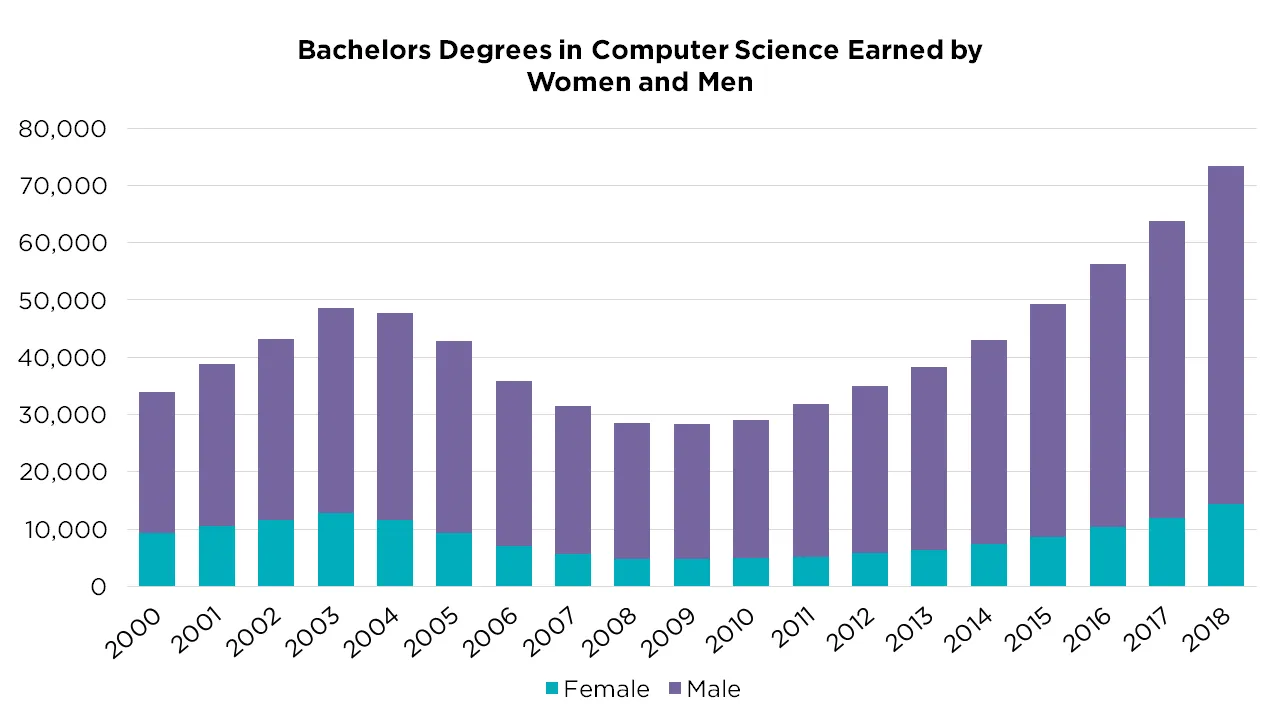How Many Computer Science Graduates Per Year?
Computer science is one of the most popular and in-demand college degrees today. But exactly how many students graduate with computer science degrees every year?
If you’re short on time, here’s a quick answer: Approximately 100,000 students graduate with bachelor’s degrees in computer science per year in the United States.
This comprehensive article will provide an in-depth analysis of computer science graduation rates. We’ll examine national graduation data, trends over time, comparisons to other STEM fields, breakdowns by gender, and much more.
Total CS Graduates Nationally
Computer Science is a highly sought-after field, and the number of graduates in this field has been steadily increasing over the years. The demand for computer science professionals has grown exponentially with the rise of technology in various industries.
Let’s take a closer look at the total number of computer science graduates nationally.
Annual Number of CS Graduates
According to the latest statistics, the number of computer science graduates per year has been on the rise. In 2020 alone, there were approximately 79,000 computer science graduates in the United States.
This number has been steadily increasing over the past decade, with a significant growth rate of around 10% each year.
The increase in the number of computer science graduates can be attributed to several factors. Firstly, the demand for computer science professionals has been on the rise due to the rapid advancement of technology and the need for skilled individuals to develop, maintain, and innovate in this field.
Additionally, many universities and colleges have expanded their computer science programs to meet the growing demand for graduates in this field.
Regional Differences
While the total number of computer science graduates nationally is impressive, it’s important to note that there are regional differences in the distribution of these graduates. Tech hubs like Silicon Valley, Seattle, and Boston tend to produce a significant number of computer science graduates each year.
These regions have a high concentration of technology companies and startups, leading to a greater demand for computer science professionals.
On the other hand, smaller towns and cities may have fewer computer science graduates due to limited resources or a smaller tech industry presence. However, with the increasing popularity and accessibility of online education, individuals from all regions now have the opportunity to pursue a computer science degree and contribute to the field.
Future Outlook
The future looks promising for computer science graduates. The Bureau of Labor Statistics predicts that the demand for computer and information technology occupations will continue to grow at a faster-than-average rate in the coming years.
This means that the number of computer science graduates will likely continue to increase to meet this demand.
Furthermore, the COVID-19 pandemic has accelerated the digital transformation of many industries, leading to an increased need for computer science professionals. From remote work to e-commerce, technology has become an integral part of our lives, and computer science graduates play a crucial role in driving innovation and solving complex problems.
CS Graduate Trends Over Time
Computer Science (CS) is a field that has experienced significant growth and demand in recent years. As technology continues to advance and permeate every aspect of our lives, the need for skilled computer science professionals has skyrocketed.
One way to gauge the growth of the field is by examining the number of CS graduates each year.
Increasing Number of CS Graduates
The number of computer science graduates per year has been on a steady rise. According to the National Center for Education Statistics, the number of CS bachelor’s degrees awarded in the United States increased by 79% between 2010 and 2019.
This surge in graduates can be attributed to several factors, including the growing demand for technology-related jobs and the increasing recognition of the importance of computer science skills in various industries.
Impact of Industry Demand
The rapid growth of the technology industry has played a significant role in driving the increase in CS graduates. Companies across various sectors, including finance, healthcare, and e-commerce, are increasingly reliant on technology and require skilled professionals to develop and maintain their systems.
This demand has led to an influx of students pursuing computer science degrees to meet the industry’s needs.
Advancements in Technology
The pace of technological advancements has also contributed to the rise in CS graduates. As new technologies emerge, such as artificial intelligence, big data, and cloud computing, there is a need for individuals who can understand and harness these technologies.
This has led to a surge in enrollment in computer science programs as students recognize the opportunities and potential career growth associated with these cutting-edge fields.
Investment in Computer Science Education
Another factor driving the increase in CS graduates is the investment in computer science education at all levels. Governments, educational institutions, and private organizations have recognized the importance of computer science skills and have taken steps to promote and expand computer science education.
This includes initiatives to introduce coding and computational thinking in early education and scholarships to encourage more students to pursue computer science degrees.
The Future of CS Graduates
As technology continues to advance and evolve, the demand for computer science graduates is expected to remain high. According to the Bureau of Labor Statistics, employment in computer and information technology occupations is projected to grow 11% from 2019 to 2029, much faster than the average for all occupations.
This indicates a positive outlook for CS graduates in terms of job prospects and career opportunities.
CS vs. Other STEM Fields
Computer Science (CS) is a rapidly growing field that offers a wide range of career opportunities. When comparing CS with other STEM (Science, Technology, Engineering, and Mathematics) fields, it is important to consider factors such as job prospects, salary potential, and overall demand.
Job Prospects
The job prospects for CS graduates are undeniably strong. With the increasing reliance on technology in various industries, the demand for skilled computer scientists continues to grow. According to the Bureau of Labor Statistics, employment in computer and information technology occupations is projected to grow 11 percent from 2019 to 2029, much faster than the average for all occupations.
This indicates a promising job market for CS graduates.
On the other hand, while other STEM fields such as biology, chemistry, and physics also offer a range of career opportunities, the job growth in these fields may vary. It is important for individuals interested in pursuing a STEM career to research the specific job prospects within their chosen field.
Salary Potential
CS graduates often enjoy competitive salaries due to the high demand for their skills. According to the National Association of Colleges and Employers, the average starting salary for computer science graduates in 2020 was $71,500, which is significantly higher than the average starting salary for graduates in many other fields.
While salaries in other STEM fields can also be lucrative, they may not always match the earning potential of CS. Factors such as industry, location, and level of education can influence salary potential in any field.
It is important to consider these factors when comparing the earning potential of CS with other STEM fields.
Overall Demand
CS professionals are in high demand across various industries. From software development to cybersecurity, CS skills are needed to drive innovation and solve complex problems. This high demand ensures a steady stream of job opportunities for CS graduates.
While other STEM fields also contribute to technological advancements and scientific breakthroughs, the overall demand for CS professionals is often greater. The rapid growth of technology and the increasing integration of digital solutions in everyday life contribute to the sustained demand for CS graduates.
It is important to note that the demand for professionals in different STEM fields may fluctuate based on factors such as industry trends, economic conditions, and government funding. Staying updated on the latest developments in the field can help individuals make informed decisions about their career paths.
CS Graduates by Gender
When it comes to computer science graduates, it is important to consider the gender distribution. Over the years, there has been a significant increase in female students pursuing degrees in computer science. This is a positive trend as it promotes gender diversity in the tech industry.
Increasing Female Representation
In the past, computer science was predominantly male-dominated. However, recent data shows a rise in female enrollment in computer science programs. According to a report by the National Center for Education Statistics, the percentage of female computer science graduates has steadily increased over the years.
In fact, the number of women graduating with computer science degrees has more than doubled in the last decade.
This increase in female representation is encouraging and reflects the efforts made by various organizations and institutions to promote gender equality in the field of computer science. Initiatives such as Girls Who Code and Women in Technology have played a significant role in encouraging young women to pursue careers in technology.
Challenges and Opportunities
While the increase in female computer science graduates is a step in the right direction, there are still challenges that need to be addressed. The gender gap in the tech industry remains a concern, with women being underrepresented in leadership positions.
However, this also presents an opportunity for companies and organizations to focus on diversity and inclusion. By creating a supportive and inclusive environment, companies can attract and retain female talent in the tech industry.
Top CS Programs by Graduation Numbers
When it comes to computer science (CS) programs, the number of graduates each year can vary greatly among different universities. Some institutions have established themselves as leaders in this field, consistently producing a high number of graduates who go on to make significant contributions to the industry.
Here are some of the top CS programs known for their impressive graduation numbers:
1. Massachusetts Institute of Technology (MIT)
MIT has long been recognized as one of the world’s leading institutions for computer science education. With its rigorous curriculum and cutting-edge research opportunities, MIT consistently produces a significant number of CS graduates each year.
The program’s emphasis on problem-solving and innovation prepares students for successful careers in various areas of computer science.
2. Stanford University
Stanford University’s CS program is another powerhouse in terms of graduation numbers. Known for its focus on both theoretical and practical aspects of computer science, Stanford produces graduates who are well-equipped to tackle complex challenges in the field.
The university’s close proximity to Silicon Valley also provides students with unique networking and internship opportunities.
3. University of California, Berkeley
The University of California, Berkeley is renowned for its strong CS program, attracting talented students from around the world. With a diverse range of courses and research opportunities, Berkeley prepares its graduates for successful careers in areas such as artificial intelligence, software development, and cybersecurity.
4. Carnegie Mellon University
Carnegie Mellon University is known for its interdisciplinary approach to computer science education. Graduates from this program often excel in areas such as robotics, machine learning, and data science.
The university’s strong industry connections and collaborative research opportunities contribute to its high graduation numbers.
5. University of Illinois at Urbana-Champaign
The University of Illinois at Urbana-Champaign is home to a highly regarded CS program. With its comprehensive curriculum and state-of-the-art facilities, the university produces graduates who are well-prepared for the demands of the industry.
The program’s focus on practical applications of computer science sets its graduates apart.
These are just a few examples of the top CS programs known for their high graduation numbers. It’s important to note that the number of graduates each year can fluctuate, and other universities may also have notable CS programs.
Ultimately, when choosing a CS program, it’s crucial to consider factors such as curriculum, faculty expertise, research opportunities, and alumni success.
Conclusion
In conclusion, approximately 100,000 students graduate with bachelor’s degrees in computer science from U.S. universities every year. This number has risen dramatically over the past decade. While men continue to outnumber women graduating in CS, the gender gap is slowly closing.
The top CS programs produce a significant proportion of graduates in this continuously growing field.







